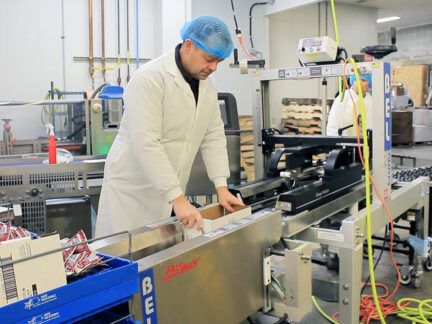Customer Success Story: Pace Processing Streamlines Baked Goods Line
Overview
Rapid growth presents both a unique opportunity and a substantial challenge for food manufacturers. This often requires that companies make significant changes to their production lines without missing a beat, as stalled output can represent significant lost earnings. By investing in the right equipment and streamlining throughput, companies can radically improve efficiency, reduce the amount of time spent fixing problems, and meet new demand as soon as it arises.
Pace Processing (Pace) is an example of such a company. For the past almost 20 years, this commercial bakery located in British Columbia, Canada has experienced consistent growth. Since 2014, it has seen double-digit growth rates every year, producing a range of frozen foods for the North American retail and foodservice industries. These include cakes, baked goods, pizzas, pizza toppings, gluten-free toppings, and other baked goods. The company maintains six production plants with close to 97,000 square feet of space.
“We have grown substantially,” said Jason Darrah, vice president of operations at Pace Processing. “We have done a good job offering a variety of products, from focaccia bread to pepperoni cheese sticks to a cake line and gluten-free facilities. With this increased growth, we recognized the need to automate."
The Problem
Automation comes with its own set of challenges, however. Inadequate machinery tends to require more maintenance and troubleshooting, leading to a significant amount of human labor and downtime. These factors can offset profit margins. Systems properly designed for the application result in quicker production output, fewer malfunctions and more uptime, yielding improved profits.
"Our need was for case erecting, case sealing and tray forming machines that would allow our process lines to operate efficiently," added Darrah. "In 2014, we were running several other case packers, but because of our growth they were no longer able to handle the output on our lines, and considerable machine servicing was required to keep them operational. It was then that we began looking for better automation options."
The Solution

Semi Automatic Case Taping
One of the solutions was a semi-automatic case taper from Wexxar Bel—a leading manufacturer of machines for automated corrugated container packaging applications. Pace acquired a BEL 150 Semi-Automatic Pressure-Sensitive Case Taper for use on one of its end-of-line packing operations. The case sealer can seal a wide range of case sizes at speeds up to 30 cases per minute with quick size changeovers.
Automatic Case Forming, Packing, and Sealing
In Pace's high-throughput lines, the company began looking at replacing some of its older case former/packers with more reliable equipment. Again, the company turned to Wexxar Bel for options. Pace settled on the BEL 505 Semi-Automatic Case-Former and Pack Station for two of its facilities.
The BEL case former and pack station can handle and form a wide range of case sizes and various case types, with a versatile design that allows a high degree of customization. More importantly, this setup makes product changeovers easy, quick, and flexible. Tool-less case size changes are simple and quick, with change points accessible from both operational sides of the machine.
Tray Forming

In addition to the end-of-line case packing and sealing processes, Pace desired to upgrade its automation for tray forming to support its sheet cake production line. The paper-based trays, which are 12" x 16" x 2.5", are put onto baking sheets, cake batter is deposited into the trays, then into ovens for baking.
Once baked, the sheet cake may be cut into different shapes and sizes depending on the customers' requirements or it may be shipped as-is, as a bulk item, in which case the tray acts as the support for the cake when it is moved downstream through the packaging line.
"To automate this tray forming process, we selected the IPAK TF200 Fully-Automatic Tray Former, again from Wexxar Bel," said Darrah. "We looked at other systems, but the TF200 was definitely more robust for our needs and has a high level of flexibility. We can interchange the mandrel on the machine to achieve different depths or tray sizes should we desire in the future. We were also attracted to the fact that size changes can be performed in less than 10 minutes."
Featured on Food Engineering Magazine. Read the full article here.
Featured on Snack Food & Wholesale Bakery magazine. Read the full article here.

